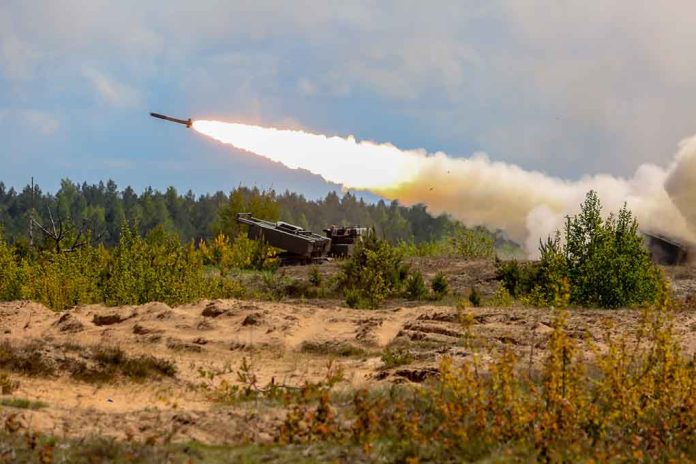
Ukrainian forces set a Russian oil depot ablaze in a strategic attack designed to cripple Putin’s military supply lines and degrade his capacity to wage war against Ukraine.
Key Takeaways
- Ukraine’s Armed Forces successfully struck the Atlas oil depot in Russia’s Rostov Oblast on June 23, causing significant fire damage
- The targeted facility supplied critical fuel and lubricants to Russian military units operating in occupied parts of Luhansk and Donetsk
- The operation involved Ukraine’s special operations units, rocket forces, and artillery in a coordinated assault
- The same depot was previously targeted in November 2024, indicating its strategic importance to Russia’s war effort
- This strike represents Ukraine’s ongoing strategy to undermine Russia’s logistical capabilities and force an end to the invasion
Strategic Strike Against Russian Military Supply Chain
In a bold strategic move against Russian military logistics, Ukrainian forces successfully attacked and set ablaze the Atlas oil depot in Russia’s Rostov region on June 23. The operation specifically targeted a facility providing essential fuel and lubricants to Russian military units positioned in the occupied territories of Luhansk and Donetsk. This precision strike, carried out by Ukraine’s special operations forces working in concert with rocket forces and artillery, created a significant disruption in Russia’s ability to supply its frontline troops with vital resources needed to maintain offensive operations against Ukraine.
“Ukraine’s Armed Forces struck the Atlas oil depot in Russia’s Rostov Oblast overnight on June 23, the General Staff reported,” said General Staff
Yuri Slyusar, acting governor of Rostov Oblast, confirmed the attack resulted in a substantial fire at the facility but reported no casualties. While the full extent of the damage remains under assessment, Ukrainian military bloggers documented fuel tanks engulfed in flames during the incident. The geographic significance of Rostov Oblast cannot be overstated, as its proximity to Ukraine makes it a crucial staging ground for Russia’s ongoing military operations and logistical support networks that enable Putin’s forces to continue their aggression against sovereign Ukrainian territory.
Systematic Degradation of Russia’s War Machine
This latest strike represents a continuation of Ukraine’s methodical campaign to systematically degrade Russia’s ability to sustain its illegal invasion. By targeting the Atlas oil depot, Ukrainian forces have struck at a critical weak point in Russia’s military infrastructure, potentially forcing Russian commanders to divert resources away from combat operations to address these logistical vulnerabilities. The fact that this same facility was previously targeted in November 2024 underscores its strategic importance to Russia’s war effort and Ukraine’s determination to neutralize these threats to its sovereignty.
“The defense forces continue to take all measures to undermine the military and economic potential of the Russian occupiers and force the Russian Federation to stop its armed aggression against Ukraine,” said General Staff
Ukraine’s military strategy has increasingly focused on disrupting Russian supply chains through precision strikes against fuel depots, rail infrastructure, and ammunition stockpiles. These operations aim to create cascading effects throughout the Russian military system, diminishing their combat effectiveness while conserving Ukrainian resources. By attacking these logistical centers rather than solely engaging Russian forces on the battlefield, President Zelenskyy’s military commanders are demonstrating sophisticated tactical thinking that maximizes impact while minimizing the risk to Ukrainian personnel.
Long-Term Strategic Implications
The continued targeting of Russian logistics infrastructure signals Ukraine’s commitment to a long-term strategy of attrition against Russian military capabilities. These operations are designed to steadily erode Russia’s ability to sustain combat operations by increasing costs, complicating supply efforts, and forcing Russian commanders to divert combat resources to protect vulnerable logistics hubs. While Western media often focuses on territorial gains and losses, these behind-the-lines operations may ultimately prove more decisive in determining the outcome of Putin’s ill-conceived war against Ukraine.
As Russian forces continue to struggle with supply shortages and logistical challenges, Ukraine’s strategy appears increasingly effective. The destruction of fuel supplies at facilities like the Atlas depot directly impacts Russia’s ability to conduct offensive operations, maintain equipment, and transport troops and supplies to the front lines. This asymmetric approach allows Ukraine to impose significant costs on Russia without necessarily engaging in direct confrontations where Russia’s numerical advantages might prevail, demonstrating President Zelenskyy’s commitment to leveraging Ukraine’s advantages in intelligence and precision strike capabilities.














